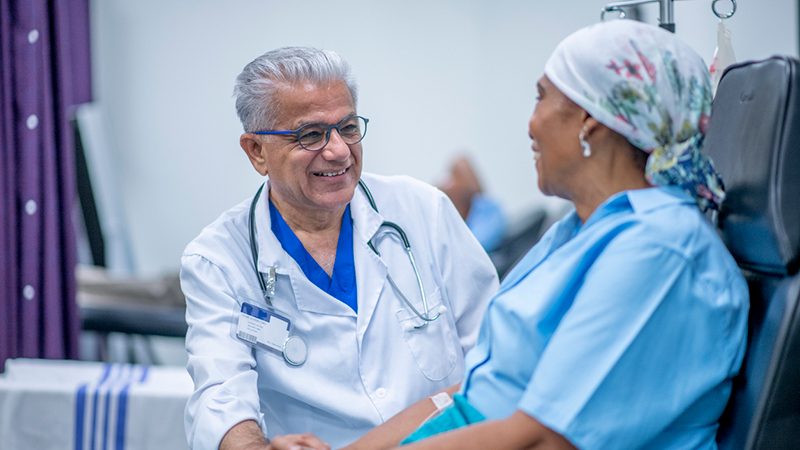Research for All: Improving Representation in Clinical Trials
October 23, 2025
Clinical trials are the backbone of progress in cancer care. They open the door to groundbreaking treatments and provide access to care for patients who might otherwise face barriers. But for cancer research to truly improve cancer treatment and care, patients who participate must reflect the makeup of the communities who will ultimately benefit.
Today, many groups remain underrepresented in cancer clinical trials. The US population includes 30-40% minorities – 14% African American, 19% Latino/Hispanic, 6% Asian, and less than 2% indigenous Americans. But some populations, such as African American and Hispanic American communities, take part in cancer clinical trials at low rates. In 2024, less than 5% and 1% enrolled in these studies respectively.
This lack of representation, which extends beyond race into age, sex, and geographical location, limits what we learn about new treatments and how they work across various populations. In turn, this can significantly impact the quality of care available to all groups.
At LSU LCMC Health Cancer Center, we are committed to changing this narrative. Through community partnerships, research that prioritizes inclusion, and patient-centered care, we are working to ensure our trials reflect the patients we serve. By making clinical trials more accessible, we can deliver more discoveries that improve outcomes for everyone.
Why Representation in Clinical Trials Matters
Cancer is complex, and no two cancer journeys look the same. Factors like age, sex, race, ethnicity, diet, lifestyle, and environmental exposures can all play a role in a person’s risk of developing cancer and how they respond to treatment.
For instance, age is the biggest risk factor for many kinds of cancer. But there is a major gap in clinical trial participation among older populations, making it more challenging to prescribe the right medications for older adults as they become available.
There are also differences in how women respond to cancer treatment compared to men, yet women are still underrepresented in health research.
If trials don’t reflect the composition of the population cancer treatment is intended for, important insights into future care can be missed, leaving patients without treatments tailored to their needs.
Beyond biology, social and environmental factors can influence cancer risk and outcomes. Where someone lives, their access to healthy food, exposure to environmental toxins, or ability to access timely healthcare all contribute to differences in cancer occurrence and outcomes. By ensuring diverse participation in trials, researchers can better understand how these factors intersect with treatment effectiveness. That way, they can design therapies that meet the needs of real patients.
Representation in clinical trials isn’t just about balanced outcomes – it’s also about rigorous science. Inclusive research leads to stronger evidence, more personalized care, and better outcomes for everyone.
Barriers to Clinical Trial Participation
The benefits of clinical trials are clear, but many patients face obstacles that make participation challenging. These barriers can prevent trials from reflecting the people most impacted by cancer.
Structural and logistical barriers. Clinical trials aren’t always convenient. Some may be hours away from where patients live. The costs of travel, lodging, or time away from work can add an additional burden. Even when trials are offered nearby, lack of reliable transportation or financial support may put them out of reach.
Awareness and trust. Some patients may not know that clinical trials are an option, or they may only hear about them late in their treatment journey. Others may carry mistrust due to historical medical research or negative healthcare experiences, making them hesitant to participate.
Language and cultural differences. Patients who speak languages other than English, or who come from cultural backgrounds with different perspectives on healthcare, may struggle to navigate trial information or feel comfortable engaging with the healthcare system. Without translated materials and culturally sensitive communication, these patients may be less likely to take part.
By recognizing and addressing these barriers, we can create more accessible and inclusive trials, bringing lifesaving opportunities within reach for more patients.
How LSU LCMC Health Cancer Center Is Improving Clinical Trial Representation
LSU LCMC Health Cancer Center has anchored its mission in Louisiana’s communities to ensure everyone has access to prevention, care, and clinical trials.
Through our Office of Community Outreach and Engagement (COE), we work directly with local communities to assess needs and create targeted interventions. The COE’s work focuses on cancer prevention, screening, clinical trial access, and policy advocacy tailored specifically to Louisiana communities.
These efforts extend beyond traditional medicine by addressing economic stability, housing, education, food access, and cultural context, recognizing that these factors deeply influence cancer outcomes.
The Gulf South Clinical Trials Network has expanded to over 50 clinical sites across the Gulf South region with more than 30 kinds of cancer trials available through the network. Previously, patients would need to travel out of state to take part in a clinical trial. With this network and the partnership of leading healthcare organizations, the same treatments and trials are available in communities who need them the most.
Additionally, the Virtual Research Nurse (VRN) Program leverages telehealth to connect rural and community hospitals with trained research nurses, ensuring trials are accessible even in remote areas.
Through these varied efforts, LSU LCMC Health Cancer Center not only expands access to groundbreaking cancer care but also ensures that research is representative of those who need it most.
